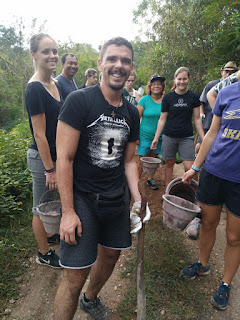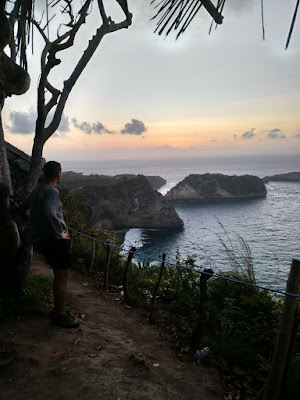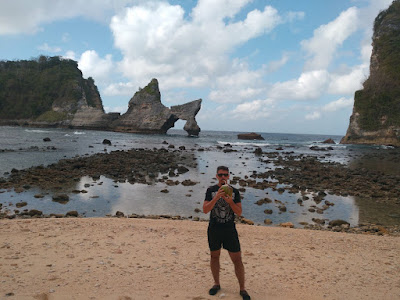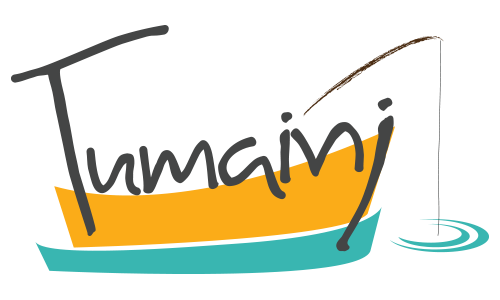Write a book, plant a tree and have a... solidarity trip!
 |
| Jose with the rest of the volunteers. |
Jose Aparici knows what it is like to live "in the middle of the jungle". He volunteered for several weeks in Nusa Penidaone of Bali's most undiscovered islands. He combined the work on the beaches and in the garden with english classes and also took the opportunity to touring the island by motorbike. We interviewed him to find out more about his adventure.
Why did you choose Bali and specifically Nusa Penida for your solidarity trip?
I have always been attracted to Asia and nature. I think it is very important not to lose the essence of places because of the tourist invasion. That's why I loved this place.
Did you have any fears when you set out on your solidarity trip? How did you overcome them?
The truth is that I had no fears. I'm a pretty positive person and fear what you don't know first hand. it doesn't make sense. And now that I know him, there would have been no reason to be afraid.
How did you prepare for your trip?
Searching for flights on my own and following the Tumaini recommendations And with great enthusiasm!
 |
| Spanish volunteers gave English classes to the youngest children. |
What was it like coming to the project and what surprised you the most?
With a lot of jet lag diluted by the illusion. I was surprised by the joy that the local people had... It is a joy that is contagious.
The project is in an incredible environment, could you describe it?
The centre is almost, so to speak, in the middle of the jungle. There were several cabins to share and a common room with 7 beds where I slept. All with mosquito nets. What I liked most was that you were in contact with nature just by stepping out of the room. The dining area has some very original tables made of huge, one-piece log cuts, and apart from the rooster, you can't stop hearing gekos! I didn't know what they were until I arrived in Bali. They are a kind of lizards that make that sound... Gue koo!
 |
| Jose worked in the vegetable garden, on the beach and in English classes. |
What tasks did you carry out in the project?
We tidied up the road to the centre, cleaned beaches, worked in the vegetable garden and recycled bottles to make vertical planters. And twice a week we had English classes.
Did you meet other volunteers and what was your relationship with them?
Yes, I met Americans, English, Spaniards and a Frenchman. All younger than me and very nice people.
How about the Balinese people you have met?
The people, as I said, were very cheerful. I didn't get intimate enough to know any personal stories, but looking at their perennial smiles, their lives are happy!
What have you learned about Balinese culture and way of life?
They are more religious than I thoughtThey have a rather meagre but very tasty cuisine. What surprised me was that, as in Mexico, cockfighting is very popular!
 |
| Jose took advantage of his trip to tour the island by motorbike. |
Did you take advantage of your trip to go sightseeing? What did you visit?
I travelled around the island of Nusa Penida by motorbike. The south of the island is a real paradise of cliffs and coves that are rarely visited. Incredible. I also spent a night in Ubud, in Bali Bali, and I really liked the bohemian atmosphere and the monkey forest (a natural reserve known for the group of monkeys that inhabit it)!
How would you encourage others to take part in a solidarity trip?
They always say that in life you have to write a book, plant a tree and have a child... After living through this experience, it is obvious that the person who coined this expression did not take part in a solidarity trip.. Something not to be missed. Plus, I'll take my little ones with me when they're older!
 |
| Tasting coconut water on the beach. |
Jose Aparici travelled to the environmental project in Nusa Penida in July 2017.



